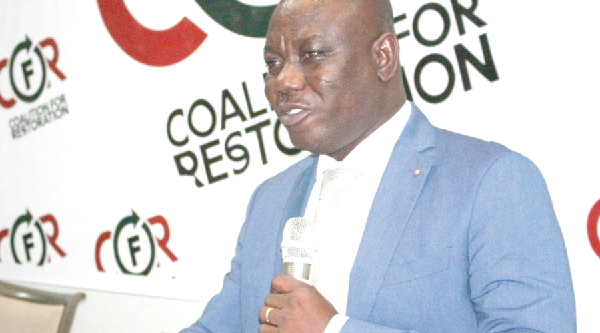
Cost of mobile money interroperability concealed — Isaac Adongo
The Member of Parliament (MP) for Bolgatanga Central, Mr Isaac Adongo, has challenged the government to do a complete project appraisal of the interoperability system to determine the true cost of running it.
He said the US$4.5 million which the government said was the cost of the project was just the capital expenditure of the infrastructure and did not include the operational cost for running it.
In an interview with the GRAPHIC BUSINESS, he stated: “Sibton’s US$1.2 billion cost was an aggregation of 25 years cost and it included cost of operations over the 25-year period and I, therefore, dare the government to also run such an appraisal over the next 25 years.”
“You have just developed a project for US$4.5 million and that is just your capital cost. What is your administrative and operational cost over the next 25 years?
“How much have you budgeted for the employees who will manage this system over the next 25 years? How much will the annual renewal of licences cost? You have done all of these and someone has factored all of these in his cost and you say it’s expensive,” he stated.
“Sibton gave us a comprehensive cost for the next 25 years, which includes the capital cost and that of the operational cost; you have just picked your initial capital cost and you say yours is cheaper,” he added.
Additional cost
Mr Adongo also claimed that the government had built an additional GH¢3 billion of cost to be paid by the service user, which was more expensive for the users.
He said the Sibton system had a charge per volume to the users at GH¢1.5, unlike the system in place now which attracted a GH¢2.5 charge.
“Aside from that, another additional cost of US$4.5 million is to be paid to a Haitian company to monitor revenue assurance,” he indicated.
Benefits of interoperability system
Despite the controversies surrounding the system, the MP said the system would help improve the financial sector in the country.
“Financial inclusion all over the world is seen as one of the best instruments for deepening the financial sector. It means that you can mobilise resources and use the players in the market to channel these resources into areas where they are best required,” he noted.
To that extent, he said it was important to have interoperability but also meant that beyond interoperability, there were other legs that needed to be pursued to optimise it.
“At the end of the day, people are not just going to have bank accounts because there is interoperability, but it means that if the person has a bank account and wants to deposit money into it, he simply can put it on his mobile money wallet and transfer it into his bank account and vice-versa. He probably will not need to go into the banking hall,” he noted.
“This makes things easier and once the money gets into the banking system, chances are that you have been able to mobilise cash outside the normal realm and this facilitates the ability to move more money into the system,” he added. — GB